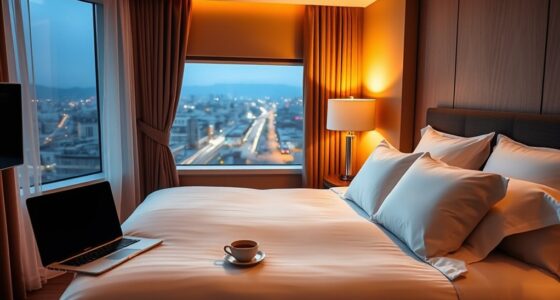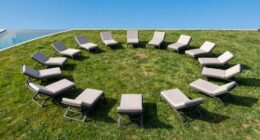After a long trip, focus on restoring your sleep by adjusting your schedule gradually, creating a dark, cool, and quiet environment, and avoiding blue light before bed. Stay hydrated with electrolytes and water-rich foods, while eating balanced meals to support recovery. Incorporate gentle movement and relaxation techniques like stretching and mindfulness to reduce soreness and stress. With these strategies, you’ll bounce back faster—continue for more tips on making your recovery seamless.
Key Takeaways
- Prioritize sleep by adjusting your schedule, creating a dark, cool environment, and avoiding blue light before bed.
- Rehydrate with electrolyte solutions and water-rich foods to restore hydration and support healing.
- Engage in gentle stretching, walking, and compression to improve circulation and reduce travel-related soreness.
- Practice mindfulness, deep breathing, and journaling to manage stress and promote emotional recovery.
- Allocate 5-7 days for full physical, mental, and circadian adjustment post-travel.
Understanding the Impact of Travel on Physical and Mental Recovery
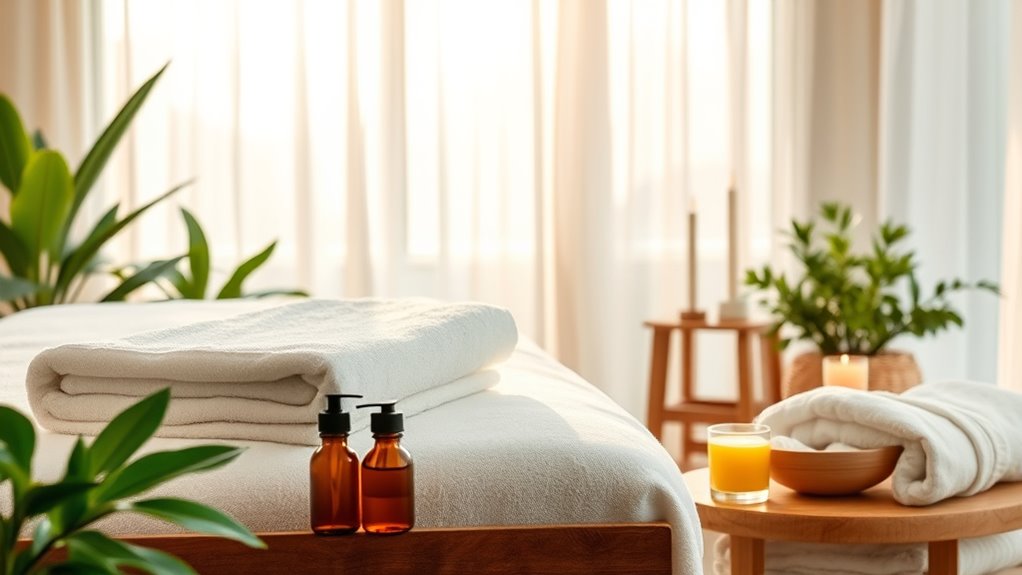
Travel can profoundly disrupt your body’s physical and mental recovery processes, especially after long or frequent trips. Your travel gear, such as comfort items and recovery tools, plays an essential role in easing this strain. Cultural adjustments, like adapting to new routines and environments, can heighten stress and fatigue. Even without crossing time zones, travel impacts sleep quality and mood, making it harder to recover fully. When you don’t prioritize proper recovery, your alertness, motivation, and overall mood suffer. Long journeys increase travel fatigue, which can linger, affecting your physical and mental well-being. Recognizing how travel gear and cultural adjustments influence your body’s capacity to recover helps you develop smarter strategies. Understanding how sleep disruptions and stress levels impact your recovery ensures you address both physical and emotional stress, setting the stage for effective post-travel detox. Incorporating lifestyle adjustments such as balanced nutrition and gentle exercise can further support your recovery process.
Prioritizing Sleep: Strategies to Combat Jet Lag and Improve Rest Quality
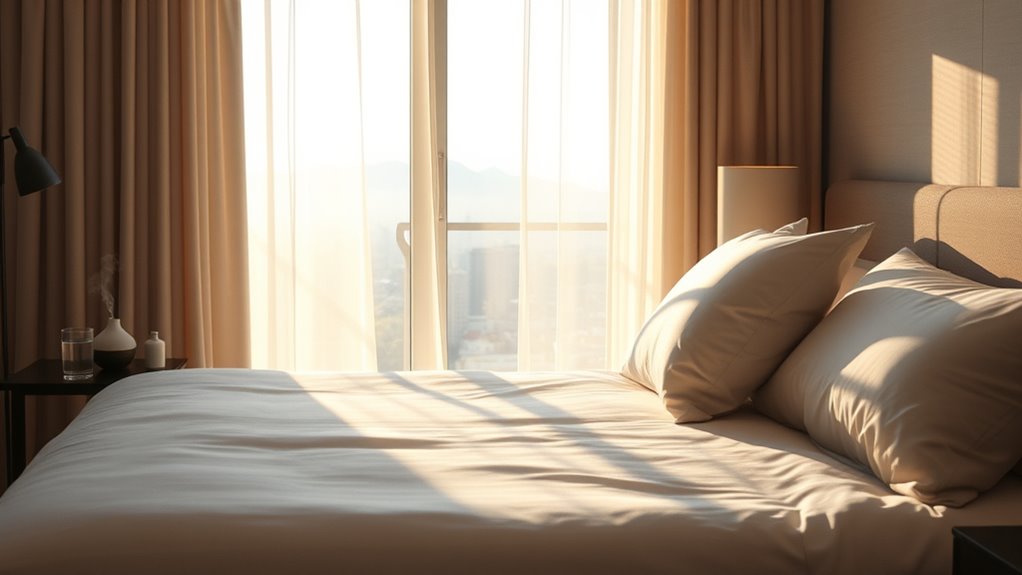
To recover from jet lag, start by adjusting your sleep schedule gradually before your trip to match your destination’s time zone. Creating a comfortable sleep environment with a dark, cool, and quiet space can help improve rest quality. Focus on these strategies to reset your internal clock and make the most of your post-travel recovery. Research shows that sleep duration typically returns to near baseline within about two days, but sleep timing and architecture may take longer to fully recover, so patience and consistency are key. Additionally, understanding narcissistic traits can help in managing interpersonal dynamics that may affect your emotional well-being during travel recovery.
Adjust Sleep Schedule
Adjusting your sleep schedule promptly after arrival is essential for reducing jet lag and restoring restful sleep. Focus on realigning your sleep timing to match your destination’s time zone to facilitate circadian adjustment. Eastward travel often causes delayed sleep and wake times, making late bedtimes challenging, while westward travel typically results in earlier sleep and wake times. To support your circadian rhythm, gradually shift your sleep and wake times before departure, ideally aligning with your destination. Morning or evening light exposure helps accelerate adaptation, depending on travel direction. Limiting long daytime naps and sticking to a consistent sleep schedule further promote proper circadian adaptation. Monitoring your sleep patterns and maintaining a regular routine can make the transition smoother and improve sleep quality during recovery. Wearable devices like the Oura Ring provide valuable insights into your sleep patterns and can help you tailor your adjustment strategies effectively. Additionally, understanding AI’s role in sleep research can offer innovative approaches to optimizing your rest during travel recovery.
Optimize Sleep Environment
Optimizing your sleep environment is essential for overcoming jet lag and ensuring restful sleep after travel. Use blackout curtains or eye masks to block out unwanted light, creating a dark space that supports melatonin production. Managing light exposure is critical; seek morning light to reset your circadian clock, but avoid bright artificial light in the evening to prevent delays in adjustment. Keep your room cool, around 60–67°F (15–19°C), and minimize noise with earplugs or white noise. Remove electronic devices that emit blue light, which can disrupt your circadian rhythm. Consider using sound masking devices to further reduce disruptive noises and enhance sleep quality. Stick to a tidy, dedicated sleep space with comfortable bedding to promote deep, restorative sleep. By controlling your environment, you make it easier for your body to adapt and recover from travel fatigue. Proper sleep environment management can significantly accelerate your adjustment to the new time zone and improve overall sleep quality.
Nutrition and Hydration Tips for Speedy Rejuvenation Post-Travel

After your travels, focusing on proper hydration and nutrient-rich meals is key to quick recovery. Drinking electrolyte solutions and eating fruits like watermelon can restore fluids and boost antioxidants. Planning balanced meals with carbs, proteins, and healthy fats will help you regain energy and reduce inflammation. Proper hydration supports overall immune function, which is especially important after a long trip. Incorporating real-time insights from your financial data can help you better plan your post-travel budget and expenses.
Hydration Strategies for Replenishment
Replenishing your hydration levels promptly upon arrival is essential to recover from the dehydration caused by long flights and dry cabin air. Focus on electrolyte replenishment by consuming drinks containing key minerals like sodium, potassium, and magnesium to restore your mineral balance. Hydration timing matters: sip water steadily instead of drinking large volumes at once, which can cause discomfort. Within 30 minutes of landing, use electrolyte gummies or powders with water to boost hydration and muscle recovery. Incorporate light, water-rich foods such as fruits and vegetables to support rehydration and nutrient replenishment. Avoid excessive caffeine or alcohol, as these can hinder hydration. Maintaining proper hydration is crucial for overall health and energy levels during recovery. Consistent small sips and strategic electrolyte intake over the first few days will help you recover faster and re-establish your hydration baseline. Additionally, choosing vegetable juices rich in water content and nutrients can further enhance your hydration efforts.
Nutrient-Rich Meal Planning
Effective post-travel meal planning focuses on balancing macronutrients to support your recovery. Proper meal composition and nutrient timing help replenish energy, repair muscles, and reduce inflammation. Prioritize lean proteins like chicken, fish, eggs, or plant-based options, paired with complex carbs such as quinoa, oats, or sweet potatoes to restore glycogen stores. Healthy fats from nuts, seeds, or avocado support cell health and inflammation reduction. Incorporate nutrient-dense vegetables like carrots or roasted squash for crucial vitamins. Timing your meals to include protein and carbs soon after travel boosts recovery. Consuming adequate hydration also plays a vital role in supporting your body’s healing process. Incorporating nutrient-dense foods enhances the overall effectiveness of your recovery plan. Consider portable snacks like trail mix or fresh fruit to keep energy levels steady. This strategic approach ensures your body gets the essential nutrients needed for rapid rejuvenation.
Effective Physical Recovery Techniques to Alleviate Soreness and Fatigue
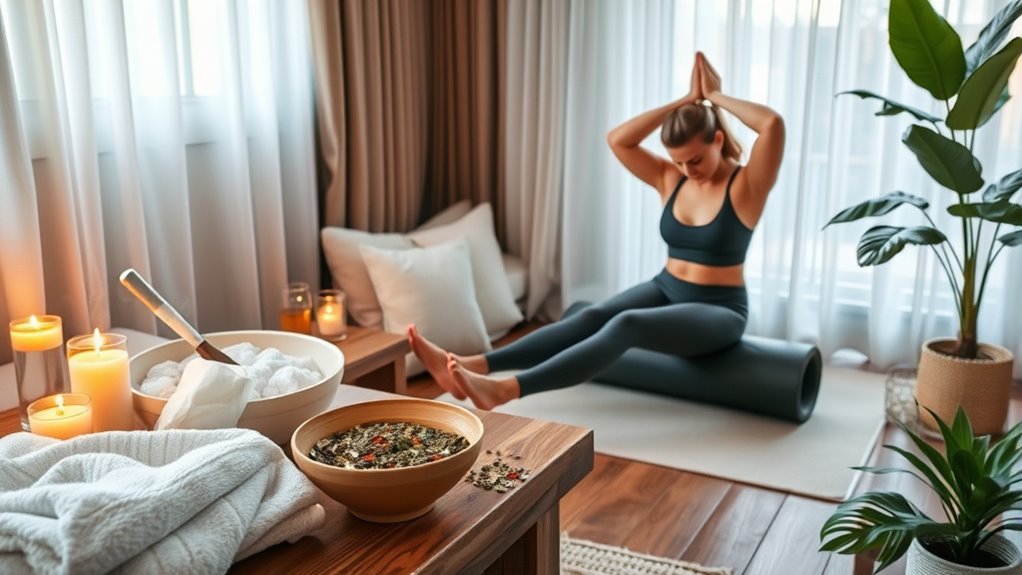
To quickly recover from travel soreness and fatigue, incorporating targeted physical techniques can make a significant difference. Focus on gentle stretching and mobility exercises, like seated twists and ankle rolls, to reduce muscle tension and improve flexibility. These moves promote better circulation, helping your body clear metabolic waste. Wearing compression stockings during travel supports circulation and minimizes swelling, while simple seated calf exercises like ankle pumps keep blood flowing. Regular walking and active breaks during transit prevent stiffness and boost circulation, speeding recovery. Prioritize rest and sleep, aiming for 7-9 hours, to facilitate muscle repair and immune function. Don’t forget your packing essentials—comfortable clothing and supportive footwear—ensuring safe movement and effective recovery. Additionally, using recovery aids such as massage tools can further enhance circulation and reduce muscle soreness. These techniques help you bounce back faster and feel revitalized.
Incorporating Psychological and Mindfulness Practices for Holistic Restoration
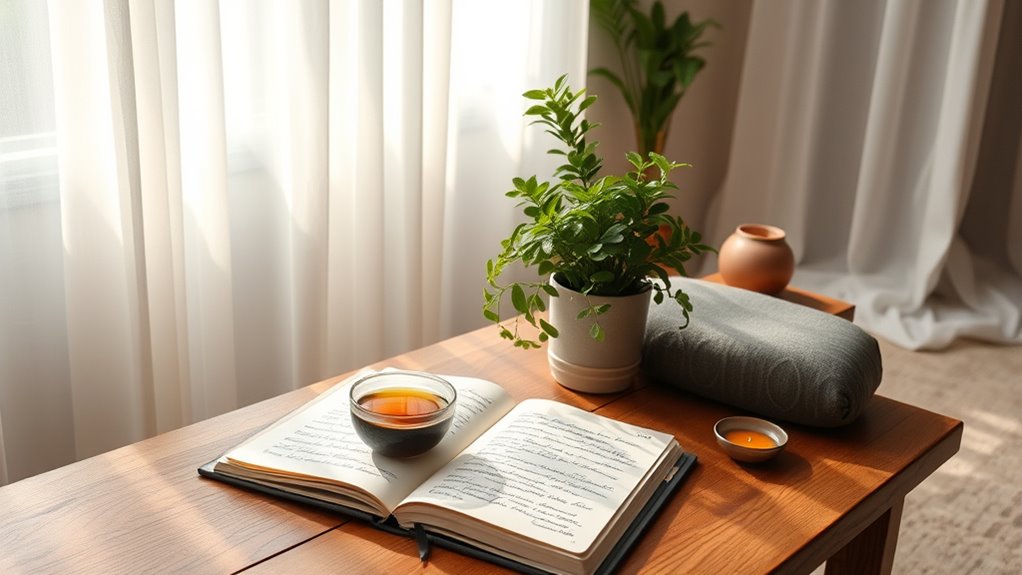
Incorporating psychological and mindfulness practices into your post-travel routine can substantially enhance your overall recovery. These techniques help manage travel-related stress, promote emotional regulation, and foster a sense of calm. By practicing mindfulness techniques like grounding exercises, you anchor yourself to the present moment, easing anxiety and rumination. Deep breathing exercises lower cortisol levels, supporting relaxation. Journaling allows you to process lingering thoughts or emotions, aiding emotional clarity. Engaging in meaningful conversations with trusted people offers emotional support and helps integrate your travel experience psychologically. Incorporate short meditation sessions or sensory mindfulness to reconnect with your environment and reduce mental clutter, creating a holistic approach to recovery. Exploring various mindfulness techniques can further deepen your relaxation and emotional renewal. These practices can transform post-travel stress into a pathway for emotional renewal.
Planning Your Recovery Timeline: Practical Steps for Optimal Rebound

Creating a recovery timeline after travel guarantees your body and mind regain balance efficiently. Start by planning at least 5 to 7 days for full recovery, allowing your circadian rhythms and skin health routines to stabilize. Use packing tips to include travel gear like sleep masks, hydration bottles, and comfortable clothing, which support rest and rehydration. Gradually adjust your sleep schedule, shifting bedtime earlier by 15-30 minutes each night before returning home to ease jet lag. Avoid long daytime naps to maintain consolidated sleep and normalize your internal clock faster. Incorporate light physical activity early on to boost circulation without overexerting. Build in flexibility for unforeseen delays, especially after long journeys or medical travel. This strategic approach ensures a smoother, more effective recovery process. Engaging in field recording techniques can also help you reconnect with your surroundings and promote mental well-being post-travel.
Frequently Asked Questions
How Can I Tailor Recovery Strategies for Different Travel Durations?
To tailor recovery strategies for different travel durations, you should focus on personalized recovery plans based on your travel length. For short trips, prioritize hydration, light activity, and sleep. For medium trips, gradually adjust your sleep schedule, boost nutrition, and incorporate massages. For long journeys, emphasize rest, monitor your fatigue levels, and use light therapy if needed. Adjust your approach based on your body’s signals and specific travel conditions for ideal recovery.
What Are the Best Ways to Manage Travel-Related Stress and Anxiety?
To manage travel-related stress and anxiety, you should focus on mindfulness techniques like focused breathing and present-moment awareness to calm your mind. Prioritize sleep hygiene by sticking to a regular sleep schedule and creating a relaxing environment. These practices help you stay grounded and reduce overwhelm, making it easier to adjust back to your routine. Remember to be patient with yourself and allow time for gradual reentry into daily life.
How Does Travel Affect Immune Function and How to Support It?
Imagine your immune system as a fortress, constantly defending against pathogen exposure. Travel stresses, like jet lag and crowded airports, weaken your immune response, making you vulnerable. To support it, stay hydrated, get good sleep, and eat nutrient-rich foods high in antioxidants. These actions help rebuild your immune defenses, ensuring your body’s natural barriers stay strong and ready to fight off infections long after you return home.
Can Specific Supplements Enhance Post-Travel Recovery?
You can boost your post-travel recovery by focusing on hydration techniques and sleep optimization, which are essential for healing. Supplements like Vitamin D, Omega-3s, and antioxidants support immune function and reduce inflammation, while creatine and collagen aid muscle and tissue repair. Prioritize restful sleep and stay well-hydrated to maximize these benefits, helping your body recover faster and regain energy after your trip.
How Should Recovery Plans Differ for Eastward Versus Westward Travel?
When it comes to recovery plans, you need to tailor tactics to tackle travel type. For eastward journeys, focus on phase-advancing strategies like early bedtimes, morning light, and melatonin to master sleep adjustment and minimize jet lag. Conversely, westward travel calls for delaying bedtimes, evening light, and gradual shifts. These tailored tactics help you tackle jet lag and optimize sleep adjustment, ensuring quicker recovery and restored performance.
Conclusion
Your post-travel recovery is your garden’s new beginning—tending to your body and mind helps blooms flourish again. With mindful rest, nourishing foods, and gentle movement, you’ll clear away the travel dust and reconnect with your inner essence. Think of this process as planting seeds for future adventures; the stronger your roots now, the more vibrant your journey tomorrow. Embrace the healing, and let your renewed energy be the compass guiding your next chapter.





